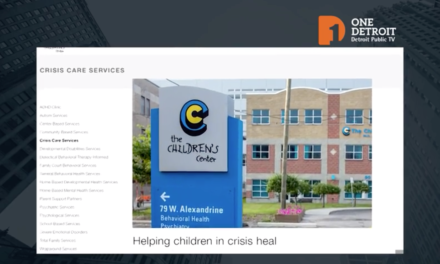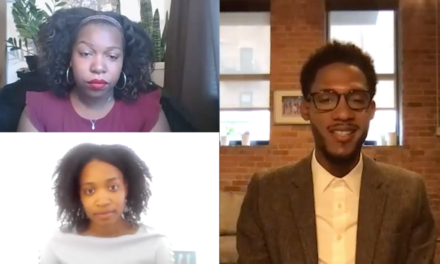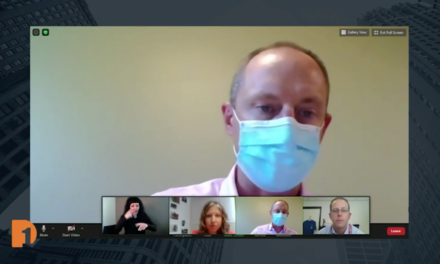Nolan Finley talks with Eric Larson, CEO of Larson Realty about the challenges of “re-opening” the economy in Detroit and across the country.
TRANSCRIPT:
Nolan Finley Eric Larson of Larson Development Group, thanks for joining us on one Detroit this morning.
Eric Larson, CEO Larson Development Group No problem.
Nolan Finley So you know this. You’re heavily involved in the redevelopment of Detroit and the progress that’s being made downtown. And that’s OK. All more or less screeched to a halt over the last few weeks with the lockdown orders and the ban on construction. And just about everything else. What is your take on this, these orders from the governor shutting down construction work and basically putting a halt to everything? Could you safely continue construction work in Detroit?
Eric Larson, CEO Larson Development Group Nolan and I think it’s a great, great point that you’re raising. And I think it’s not something that, you know, has come easy or lightly to any of us in the industry. I mean, if you think about it, there are I think about 50 states that are under a stay at home shelter in place order. Most of those states actually have deemed construction workers essential and are allowing construction work to continue. They’re modifying your work practices and protocol to make sure that the social distancing and protective gear and all that is being worn. But they have recognized that there are a number of aspects of the construction industry that are important to continue and even equally as important to help us recover as we come out of this.
Because ultimately what you’re going to need to be to have is an economy that’s ready to receive people that need to find new homes, that need to, you know, relocate, that are looking for new employment. And if the construction industry, which touches every aspect of our economy, isn’t sort of meeting that demand, we’re going to have an issue. I think that, you know, no one in Detroit we had already seen you and I talked about the increased cost, both in terms of labor and material, know we were finding unique ways to get over that. And to not only was the market starting to appreciate in Detroit to accommodate some of those increased costs. But so is the demand. Well, now we’ve got a situation where, you know, everything has been put on hold. So, a lot of people in our industry are really questioning the sort of the wisdom of our state not allowing that activity to continue. I understand the severity of this virus and the easy its ability to be transmitted. But I do think there are ways to practice safely.
Nolan Finley So you’ve looked at what people are doing in other states. Folks gather business. How do you keep workers safe?
Eric Larson, CEO Larson Development Group Well, I think there’s a couple of things. One, you know, it depends on the nature of the work. A lot of the construction trades tend to be individualized. There aren’t a lot of team activities in construction. If you think about it, they know it in some ways, it’s a little less efficient, I guess. But they typically travel to the job sites individually. They are on the job site. Most of the time outside, a lot of that work can take place outside.
So, you’re in an open-air situation. You’re not on top of each other. And so, I think there are a couple of different things. One, you know, we can look at ways to adjust the workforce and the workplace, because honestly, even when we come out of this, Nolan, I don’t think anybody thinks that we’re going to go right back to the normal way of working, even in our more traditional office environments. And so why aren’t we starting to apply some of that to those changes in the adjusted protocol? So I think it has to do with the nature of the work, the separation of the individuals and the protective gear that is often already worn in many of them, you know, sort of more complex aspects of the industry.
Nolan Finley Now, your contractors and their employees, do they want to come back to work? Eric?
Eric Larson, CEO Larson Development Group Yeah, I mean, in general and again, you know, there are those that, you know, have really been significantly impacted, whether it’s through, you know, a loved one or, you know, just the psychological sort of stress that this virus has put on a lot of people. But as a whole, the industry and the individuals that make up that industry are interested in working and want to work.
Eric Larson, CEO Larson Development Group It’s also interesting. Nolan, I mean, Detroit has come a long way. We went to an online platform right before this virus hit with the Detroit Building and Safety Department. So, they have the ability and they are continuing to process permits and plan review plans. It’s just an age they can actually do virtual inspections, which is what’s happening around the country. You actually take an iPad and you connect virtually with the inspector on-site and they can actually be providing inspection reports and approvals.
Nolan Finley What’s this costing us? Eric, in terms of downtown’s progress and Michigan’s commerce in Michigan in general? I mean, if you heard over the weekend, House Speaker Lee Chapel saying we need to shift to a safe, not safe model rather than essential, not as a non-essential model. And you’re saying that it’s safe for construction workers to go back to work, but the cost of keeping them off the job and keeping these projects stalled. What are we losing?
Eric Larson, CEO Larson Development Group Yeah. Nolan, I don’t have an idea. And that is actually something that we’re working on. Trying to try to get is local and regional information on the overall impact to the industry. But I can tell you, the construction trades have lost over thirty thousand jobs nationally. You know, hospitality revenue is down 50 percent. Residential and industrial is down forty-nine percent. And again, those are valuations, as you know, that that that are about partly existing product as well as pipeline product. So, it is having a huge impact on our economy and our industry nationwide. And in Detroit, I think, you know, we’ve always talked about the fact that Detroit tends to feel things even more significantly than the nation, just because we had been so far down in our, you know, all of sort of all of our sectors and we finally we’re coming back and we are really getting our legs under us.
Eric Larson, CEO Larson Development Group Now, what’s going to happen, Nolan, is we’re going to end up playing catch up because not only are we going to need to catch up on the construction work and be able to get back to building projects and finishing projects. But we’re also going to be dealing with loans that are going to either be foreclosed on or defaulted upon. You know, the state is already which I commend the state, especially through the MDC and MR. They’re already looking at forbearance is and pushing loan requirements out. So that’ll give some relief. But you’ve got most of the tenant base in downtown Detroit with small local new businesses. Those businesses are going to, if they survive this, are going to need a lot of assistance just to get back on their feet. And it’ll take time.
So, I think as I tend to be a very optimistic person. And in general, I think by the time we get out of this, the economy will come back. All the people that are a heck of a lot smarter than me see a fairly rapid return to the economy once we get through this. But as far as our industry is concerned, it’s going to take time. And the other thing that complicates it, Nolan, is it’s not just localized. Most of the materials are 30 percent of the materials we get from China. So that supply chain is also impacted. I mean, just think about our ability to order what we normally order on Amazon and get the next day. It’s taking weeks to get stuff. Just normal household products. Now, you put that into the industry terms and it’s going to take a while to get that supply chain back up and running.
Nolan Finley So you’re someone who builds buildings, leases, space, commercial and residential space on the personal side. Eric, a lot of people now working from home and learning to work from home and doing what we’re doing right now, interacting over the Internet through a variety of platforms. Do you believe long term the demand for commercial space, office space will subside because of this? Have we entered a new way of thinking and interact at all?
Eric Larson, CEO Larson Development Group And I don’t I and and again. And there is a lot to this, and I think time will tell.
But if you think about it, you know, there is a big push in the 90s and then early 2000s to say that everybody’s going to be working from home on because of technology that never really happened, the social interaction and the ability to come to the other as a team. I think we’ll continue to cause people to want to have traditional office settings. Do I think there will be a portion of the population that takes advantage of this ability and now sees that, you know, maybe the size of their footprint doesn’t need to be as big and so they can actually leverage. I think workweeks may be changed. So, people turn to, you know, adjusted four-day work weeks or, you know, those kinds of things where, you know, maybe the environment changes, but I don’t know that the specific demand is going to the residential side will change.
Eric Larson, CEO Larson Development Group I think you’ll see a lot more single family for rent housing demand now because I think people will look at their dense apartment living and want to be in something that gives them a little bit more space. Every apartment complex has had to shutter all of its common areas. So, the thing that you pay for. To provide extra space outside of your four walls, you can’t access. So, I think you’ll see some of that. I think you’ll see a move to less dense areas. So, I think there’ll be a little bit of a resurgence to either cities like Detroit where we actually have some land and some space or suburban markets. But again, I think in general, the fundamentals that we’ve seen over the last 10 years will continue to be relatively stable, but you will see some uptick in what I just talked about.
Nolan Finley So, Eric, finally, are you and your fellow contractors working with the governor’s office? Lobbying the governor’s office, trying to get things reopened to some degree?
Eric Larson, CEO Larson Development Group Yeah, I think everybody that has an interest in this and it’s not just our industry. Obviously, the automotive industry is lobbying hard to try and get back to work.
Eric Larson, CEO Larson Development Group And so everybody is trying to start to think logically about what is the right thing and what is the right balance. We need to continue to protect human life. But what’s the right balance relative to the state’s economy into the local economy? And yes, we are lobbying hard. We’re looking at specific examples. So as opposed to just saying, let’s turn the spigot back on, you know, let’s look at, you know, realistic ways that we can get people back to work in a safe environment. I honestly, Nolan, don’t know that that’s going to happen in the timeframe that currently is set because, you know, what’s sort of the mindset set is we’ve got another two weeks of this.
Eric Larson, CEO Larson Development Group It’s two, two and half weeks. So, by the time we got through, figuring out. The reality is I don’t think it’s going to get turned on quite that. Fast, and most of us are starting to say, OK, let’s really focus on how do we turn the economy back on what are the rules and what ultimately does the playing field,
Nolan Finley Because you lose a chunk of the construction season right now aren’t you?
Eric Larson, CEO Larson Development Group Yeah, we are. I mean, you know, you’ve commented on my glorified. It may make sense to start building more of this stuff in factories, but now we’re losing a huge part of that window with construction. We’re also losing. If you think about it, the collapse that took place both in the banking and the financial markets, as well as the real estate industry back in 2008, 2009, 2010, we didn’t have the run up of additional spec building both on the residential and office side. And so, I think you’ll see real demand, especially given how low interest rates are and assuming people get back to work and are earning a paycheck for product. And so, you know, there’s double-edged sword here. We’re losing the good weather months and we’re we don’t have the supply.
Nolan Finley So, Eric, before we go, if you could put your other hat on its head off the Downtown Development Authority and talk to us about downtown Detroit. Last time I was down there, it was just completely empty, a ghost town. How worried are you about these downtown businesses? That have no customers now.
Eric Larson, CEO Larson Development Group Yeah, Nolan. And I’m very worried about the downtown businesses. You know, the downtown Detroit Partnership, we’re actually doing a survey right now, which I’m happy to share with you, to try and understand what exactly the impact is and where some of those things, you know, where some of the opportunities to help are. You’ll know you’re seeing landlords already. Bedrock was the first to announce a three month, you know, forgiveness of rent. We’re looking at a lot of landlords that are looking at if it’s a forgiveness or red, does it maybe get paid back over a four-year period or something like that?
So maybe it’s not a total write off because, again, the landlords have mortgages that they have to pay, just like the businesses have built, you know, expenses they have to cover. And so. But I am very concerned. We talked about it a little bit earlier in many of these are small businesses. They’re small local businesses. The neat thing about Detroit was it was getting back to its entrepreneurial spirit. And that entrepreneurial spirit has taken it on the chin through this process. And so I think we’re going to need a lot of help. I think that the foundation and the corporate community is being really smart and looking at what is government going to do first and then how can we supplement that as opposed to rushing in. And I think we’ll see, as we always do, a very philanthropic, a very generous community come to support Detroit. But we’ve been doing that support for a long time. And we finally got to a place where we could be pulling back a little bit of that support and letting natural market forces carry us. And we’ve gone backwards a bit. And that concerns me.
Nolan Finley And, you know, no matter what the official decree is in terms of a reopening, you know, downtown depends on large gatherings and and social interactions, people cramming bars and restaurants and football and baseball stadiums, hockey arenas. It’s a place where, you know, it depends on density. And I worry that it’s gonna be a long time before people are comfortable in dense environments again.
Eric Larson, CEO Larson Development Group Yeah. Nolan You know, just for the downtown Detroit partnership, we have over 2000 events, most of which have already been either canceled for this year. You know, our partnership with the DEC Grand Prix, that’s been canceled, the partnership with the auto show has been canceled. I mean, that’s millions of people that, you know, come together in the downtown area on an annual basis. And so I think that’ll be impacted. I was on a call with the heads of the security teams for our bigger venues, MEO sports and entertainment venues. And, you know, they don’t see a time reels in short term where people will be coming together in mass to watch sporting events and entertainment shows.
So, yeah, I think I think in general this is going to be impactful. The mayor has already suggested a 100 million plus deficit in the city budget. You know, as less disposable income is spent. Whether it’s because it can’t be because of the orders that are in place or because people just aren’t comfortable. The more impact it’s going to have on our tax collection and ultimately our city revenue. You know, Detroit isn’t alone in that problem. I mean, this is a problem for everybody in the country. Detroit just happens to be a place that, you know, has had to work its way through it. The nice thing is, you know, because we had to do what we have had to do over the last 10 years, we got some pretty good examples. And I really do commend, again, you know, those that are getting out in front of it. TechTown is a great example where they partnered with Community Foundation and others invest Detroit to get some funds out for small businesses. The first fund you got. Delivered and distributed very quickly, there are outraising another fund. And so, I think we’ll see stuff like that for the smaller businesses and the bigger businesses are just going to continue to have to make some decisions.
Nolan Finley Eric Larson, head of both the Larson Realty Group in Downtown Detroit Partnership. Thanks for joining us today on One Detroit. We’ll check back with you soon on how things are going. Thanks.




